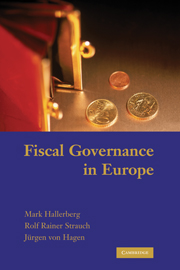Book contents
- Frontmatter
- Contents
- Acknowledgments
- 1 INTRODUCTION
- 2 ELECTORAL AND FISCAL INSTITUTIONS AND FORMS OF FISCAL GOVERNANCE
- 3 AN ACCOUNT OF FISCAL NORMS AND RULES IN THE EUROPEAN UNION FROM 1985 TO 2004
- 4 HOW FORMS OF FISCAL GOVERNANCE AFFECT FISCAL PERFORMANCE
- 5 WHY DO COUNTRIES HAVE DIFFERENT FISCAL INSTITUTIONS?
- 6 INSTITUTIONAL CHOICE IN NEW DEMOCRACIES: FISCAL GOVERNANCE IN CENTRAL AND EAST EUROPEAN COUNTRIES
- 7 EMU AND FISCAL GOVERNANCE IN EUROPE
- 8 CONCLUSION
- Bibliography
- Index
- Cambridge Studies in Comparative Politics
5 - WHY DO COUNTRIES HAVE DIFFERENT FISCAL INSTITUTIONS?
Published online by Cambridge University Press: 04 August 2010
- Frontmatter
- Contents
- Acknowledgments
- 1 INTRODUCTION
- 2 ELECTORAL AND FISCAL INSTITUTIONS AND FORMS OF FISCAL GOVERNANCE
- 3 AN ACCOUNT OF FISCAL NORMS AND RULES IN THE EUROPEAN UNION FROM 1985 TO 2004
- 4 HOW FORMS OF FISCAL GOVERNANCE AFFECT FISCAL PERFORMANCE
- 5 WHY DO COUNTRIES HAVE DIFFERENT FISCAL INSTITUTIONS?
- 6 INSTITUTIONAL CHOICE IN NEW DEMOCRACIES: FISCAL GOVERNANCE IN CENTRAL AND EAST EUROPEAN COUNTRIES
- 7 EMU AND FISCAL GOVERNANCE IN EUROPE
- 8 CONCLUSION
- Bibliography
- Index
- Cambridge Studies in Comparative Politics
Summary
A culture of public spending was pervasive in the political scene. Politicians scored points against their opponents by promising more and more spending for policies benefiting specific groups of voters, and the amount of spending they managed to obtain for their ministries, often despite what had been foreseen in the budget, was a measure of success for individual cabinet members. The government was often in minority and had to secure the support of one or more opposition parties in the parliament. In such situations, governments simply “bought” the support of an opposition party to ensure the passage of the budget through greater levels of spending. When economic growth was robust, none of this provoked much concern in the public debate. But when the crisis hit, the currency crashed, and public debt rose from a seemingly comforting 42% of GDP to over 72% within three years, it became obvious to the population that the country had to change the way fiscal policy was conducted.
A person widely respected for his knowledge and expertise served as finance minister, and he proposed a series of austerity measures to rein in the deficit. Despite his rhetorical ability and the respect he generally commanded, his cabinet colleagues refused to support his proposals, and he soon resigned. The government proposed a more scaled back version, yet parliament balked at even these measures, and soon the government itself resigned.
- Type
- Chapter
- Information
- Fiscal Governance in Europe , pp. 117 - 138Publisher: Cambridge University PressPrint publication year: 2009

